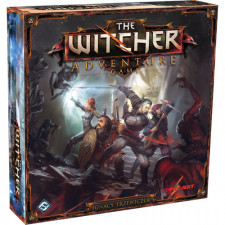The Witcher Adventure Game Review
on Jun 11, 2015
Ever since Dungeons & Dragons sparked our imaginations some four decades ago, a perfect board game translation of the freewheeling role-playing experience has become one of the white whales of game design. Talisman popularized the totally random, all-nighter adventure game, while briefer affairs like DungeonQuest eschewed in-depth character building for a fast and furious approach. As simple as the design goal seems however, we’re still no closer to an ideal substitute for D&D and its pencil-and-paper brethren. Designers the world over have tried their hand at crafting a fun, simple, player-driven adventure, but they all discover in the end it’s not as easy as it looks.
Enter Ignacy Trzewiczek, a Polish game designer known for his intricate, flavorful strategy games. While his previous fare has induced many hours of head scratching and bean counting, this time around, he’s gunning for something much simpler with The Witcher Adventure Game: a two-hour, luck-based romp around a fantasy world popularized in a series of successful video games and before that, novels originally published in Poland. There’s no advanced resource management to speak of, no planning multiple turns ahead to precisely time a major resource exchange for VP. Instead, there are colorful events, meaningful character advancement, and modest swings of luck in both directions. What’s more, there’s not much advanced strategy to speak of.
Robinson Crusoe this is not. Set aside your expectations, and you just might be pleasantly surprised. It’s actually fairly rare in my experience to come across an adventure game that offers everything; The Witcher comes close in as comfortable a time frame. A leisurely multiplayer session might break the two-hour mark, while unofficial solo variants can be knocked out in under an hour. The game is a sprint, not a contest in turtling, so every action pushes the game toward its fast-approaching conclusion. The pacing can feel uneven, however, as completing the first of the three quests can take two-thirds of the session to complete, while the last two have a tendency to snowball right over the finish line.
The clean design contributes to the game’s snappy pace. Players will take two actions from a short list and then resolve any nasty obstacles in their region. It’s a slightly looser structure than the cooperative Eldritch Horror system, on which this design is pretty clearly based. The system here is pared down to the point that any sloppy timing issues are easy to resolve. Clear icons and helpful character cards mean you won’t be referencing the well-written rulebook every turn for bizarre edge cases. Trzewiczek recognized downtime issues as one of the major problems with these types of games, and neatly managed to avoid the pitfall. It’s clean, sharp, and smooth.
Much of this game is a highly tactical affair: swinging your character slightly out of his way to snag an easy side quest, narrowly avoiding a third-tier baddy before obstacles active, or finishing an opponent’s support quest when the opportunity arises make up the bulk of the players’ decision making. I’ve been talking up the game’s luck element, but there’s at least a little more than meets the eye in the strategy department. Players will have to decide between developing early and taking up the rear and jumping out to complete some early quests before the War Track covers the land in darkness and danger. Each of the totally unique characters also has a subtly scripted strategy, which may take a play or two to uncover (hint: if you’re Geralt, kill stuff).
I do have a complaint or two. Although the brutal Foul Fate cards can just bury your characters, the favorable Good Fortune cards will only come out a few times a game. I’m definitely not complaining about how brutal the game can be, but there’s not enough variety in the Foul Fate deck, as you’ll go through it at least once a session. As rare as the Good Fortune cards are, you’d think the developers would have spent more time coming up with more cards for the bad stuff deck instead of making both stacks similar in size. Ah well, room for expansion, we can hope.
A more major issue for me is that everything can feel a little too evenly paced. As moving characters somewhat automatically generate the leads that will eventually convert to victory points, everyone is moving pretty evenly up the ladder. This dynamic can make the players feel as if they’re playing an extremely simple resource trading game, rather than focusing on the fun stories and wild adventures. In comparison with a game like Talisman or Relic, which can just hilariously stomp a player, The Witcher can feel a little tame at times--at least for someone who loves to laugh at a gamer’s misfortune. Yes, the Foul Fates can be nasty, but no one’s getting turned into a toad or pulling a Horrible Black Void card and losing instantly.
So in the end the game requires a little investment from the players: read the quest text, tell the other players why that roaming gang of bandits has been stalking you at every seedy tavern in the land. As long as you’re all willing to buy into the world for a couple hours, you’ll have a romping good time, and it won’t take all evening. The Witcher may not be the holy grail of adventure games, but what is? If you like Talisman, Geralt and the gang aren’t going to replace it, but it sure will offer a nice compromise for when you don’t have the time.

 Customer Support
Customer Support  Subscribe
Subscribe 




 Account
Account  Wishlist
Wishlist 

